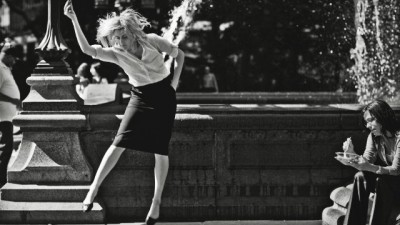
Noah Baumbach’s Frances Ha is one of the most appealing films of the year to date — and it may well end up being the most appealing indie release of the entire year. It is easily the most appealing Noah Baumbach film I’ve seen. Frances Ha has a lightness of tone and a generosity of spirit that’s unlike his previous movies. What is bitter and sometimes off-putting in Baumbach’s earlier films is bittersweet and inviting here. Of course, the easy answer that everyone comes up with to explain this difference is Greta Gerwig — Baumbach’s co-writer, star and girlfriend — and that may well be true. Without Gerwig — who I admit I fell for in Whit Stillman’s Damsels in Distress last year — the film would be unthinkable. On screen, she lights up Frances Ha and makes it truly come to life, but there’s the off-screen component to consider — a much more complex proposition.

In talking about the film in an interview with me the other day, Gerwig noted, “You realize, ‘Well, I love it and if I love it maybe other people will love it.’ So we decided just to go for it.” We’d originally been talking about the film’s use of the song “Every 1’s a Winner” by Hot Chocolate, but she expanded the idea to a broader sense, saying that this was how many of the film’s decisions were made. This attitude is what I think makes the film so special, so personal, so handmade — and so pleasantly tricky to define. This is a movie that, on the one hand, is made to feel very off-the-cuff and naturalistic, but is also incredibly stylized. The off-hand quality of some scenes sits right next to the less naturalistic Paris and Sacramento scenes.

It’s been compared — mostly because of its New York-centric vibe and being shot in black-and-white — to Woody Allen’s Manhattan. That’s reasonable on a number of levels except that Frances embodies both the Diane Keaton and Mariel Hemingway characters. But there’s as much — probably more — of the French New Wave feel to Frances Ha. The presence of a great deal of music by French New Wave composer Georges Delerue underscores that feel, but doesn’t define it. There’s also at least a hint of Richard Lester to the picture. For that matter, there’s a nod to Leos Carax’s Mauvais Sang (1986) in the bit with Bowie’s “Modern Love,” which is apt since Gerwig gives a performace with a physicality not unlike Denis Lavant in the Carax film. This mix of elements and the fact that Frances Ha is finally its own particular creature make for a heady and sometimes playfully giddy experience, but with a wistful undercurrent to the entire film.

The story itself is a kind of mini-epic on the life of its main character — a 27-year-old dancer who lives in a perpetual state of flux. She has no place of her own, but lives with a series of other people — all of whom she connects with more in her mind than in reality. She has a very tenuous hold on a job with a dance company — a hold that slips away as the film progresses. Frances’ biggest personal obsession is with her inseperable (she thinks) best friend, Sophie (Mickey Sumner), who is actually determined to strike out on her own. Her relationships and her very scattered — quietly desperate — career path are much more complex than Frances tends to realize. In a sense, the movie is about her haphazard search for grounding. That could have been both whiny and irritating (it certainly has been in other movies). Magically — thanks in no small part to Gerwig’s quirky charisma — it all works here. The results are a small scale masterpiece. Rated R for sexual references and language.
Playing at Carolina Cinemas




A sparkling, sweet, sad, funny film that might restore your faith in indie film
Fingers crossed. The indie films I’ve seen in the last twelve months have had me hanging out for Michael Bay’s new picture.
Yeah, I’ve seen some of those.
Ah i see you’re coming around. I mentioned in the other thread that this will be released on Criterion in the fall.
In the Terry Gross interview Noah Baumbach said that this was him finally feeling comfortable with his old Woody Allen obsession he had when he was younger.
I know you don’t watch but this film has been getting a lot of comparison’s to Lena Dunham’s Girl’s. Adam Driver is one of the best male actors out there today, im looking forward to seeing him in the new Coen brothers film.
Everyone’s a Winner has one of the best guitar riffs of the 70’s.
Ah i see you’re coming around.
Coming around to what?
know you don’t watch but this film has been getting a lot of comparison’s to Lena Dunham’s Girl’s
I don’t hold that against it, though comparing Gerwig to Dunham is absurd.
I’d say the comparisons are probably more Baumbach to Dunham.
In another interview Baumbach admitted he stole the Carax scene and said Modern Love is just a great song to run to.
Im glad to see Baumbach and Josh Hamilton reunited.
I guess its safe to say this movie is the ultimate Bechdel test?
I’d say the comparisons are probably more Baumbach to Dunham.
I liked the one that remarked that it was kind of like Girls “without the ‘ick’ factor.” After having seen Tiny Furniture, it would take something akin to wild horses to get me to seek out anything from Ms. Dunham.
The “ick factor” they are probably talking about is the pretty graphic sex. There almost isn’t an episode that goes by where she isn’t naked and in some kind of weird sexual situation.
There almost isn’t an episode that goes by where she isn’t naked and in some kind of weird sexual situation.
Oh, it’s like Tiny Furniture: The Series. I can think of few things as tonally at odds as Tiny Furniture and Frances Ha.
Tiny Furniture is not really like the series Girls tonally or otherwise.
If true, that can only be in its favor.
I can see the Girls similarity in the way it’s about female relationships and the playful dialogue used, and also the use of “kid” in the film.
Didn’t expect to see Dean Wareham and Britta Phillips they weren’t bad in their acting debut.
Saw this Sunday. It was OK, but considering all of the discussions here, I expected more and was somewhat underwhelmed. Fortunately, there were enough one-liners to make it worthwhile.
If I had to pick the moment that qualified as Frances’ epiphany, it would be when she pursued Sophie leaving the dorm and was left staring at her feet, but what did that image represent?
Or am I digging too deep? (Not often I get accused of this.)
I also cannot help but observe that there are a lot of “Frances Ha” types in Asheville, who have far bigger dreams than they have the ability or desire to pursue yet will often refuse to settle for the “day job” to pay the bills while they try. An American attribute, perhaps?
If I had to pick the moment that qualified as Frances’ epiphany, it would be when she pursued Sophie leaving the dorm and was left staring at her feet, but what did that image represent?
Her toes. Actually, I think it’s mostly the payoff to the whole “no socks” business from the night before. Plus, the “no socks” thing interrupted what looked like was going to turn into a real discussion about their relationship. The note looks like another path to that discussion — cut short by Sophie driving off — even though the note itself provides some degree of validation.
I also cannot help but observe that there are a lot of “Frances Ha” types in Asheville, who have far bigger dreams than they have the ability or desire to pursue yet will often refuse to settle for the “day job” to pay the bills while they try. An American attribute, perhaps?
And yet Frances ultimately does exactly what you say “they” won’t. Of course, there’s an immediate difference in that the film observes without really judging, where you’re judging. I think most people would say the condition of which you speak is a generational thing, but I’m not so sure. I saw an awful lot of it 40 years ago, too.
I’ll buy that for a dollar!
Both answers, actually. Now I know why they pay you the big bucks.
The big bucks? I don’t even get the small doe.
Everyone’s a Winner has one of the best guitar riffs of the 70’s.
It is mighty fine.
Departs by Fri., June 28.